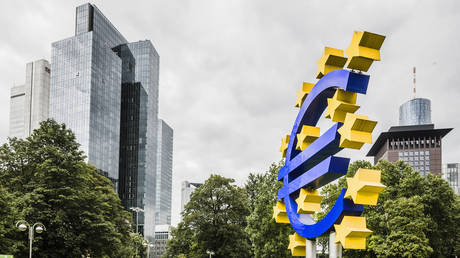
EU undecided on ways to tap Russian money
The bloc will continue to look at options for using proceeds from frozen assets, leaders have said in a summit declaration
The EU will continue to “explore options” for the seizure of revenues generated by frozen Russian assets to fund Ukraine, bloc leaders said after a summit in Brussels on Thursday.
The West has frozen roughly $300 billion in Russian sovereign funds since the start of the Ukraine conflict. Brussels-based clearinghouse Euroclear holds around €191 billion ($205 billion) of the funds and has accrued nearly €4.4 billion in interest over the past year.
Profits on the assets are estimated to stand at €2-€3 billion this year. European Commission President Ursula von der Leyen has said the first tranche of €1 billion ($1.09 billion) could be disbursed as early as July.
The EU is reportedly trying to fast-track the decision to fund Kiev amid waning support from the US, where a $60 billion aid package for Ukraine has stalled in Congress. In their summit declaration, EU leaders instructed officials to “explore all options for mobilizing funding and report back by June.”
“I am confident that we can act very quickly,” Charles Michel, president of the European Council, told reporters.
The EU is pressing ahead with a plan proposed by von der Leyen last month to use proceeds from Russian funds to procure arms for Ukraine.
Read more
EU poised to destroy international law – Kremlin
“These [proceeds] should first of all be used to buy those weapons and ammunition that Ukraine needs to defend itself,” German Chancellor Olaf Scholz said.
The idea, however, has faced resistance from a number of countries, including Malta, Austria, Luxembourg, and Ireland. “For us neutrals it must be ensured that money, for which we give our approval, is not spent on weapons and ammunition,” Austrian Chancellor Karl Nehammer said, as quoted by Reuters.
The proposal could also be blocked by Hungary, which has insisted that proceeds from Russian assets should be allocated to Ukraine’s reconstruction rather than be used for funding its military.
Meanwhile, some Western banks are lobbying against the use of asset income, fearing it could lead to costly litigation, according to Reuters.
Russian officials have repeatedly denounced the blocking of funds as “theft.” In December, Kremlin press secretary Dmitry Peskov warned that any potential seizure would face a response, signaling that Moscow had already compiled a list of Western assets that could be expropriated in tit-for-tat action.


